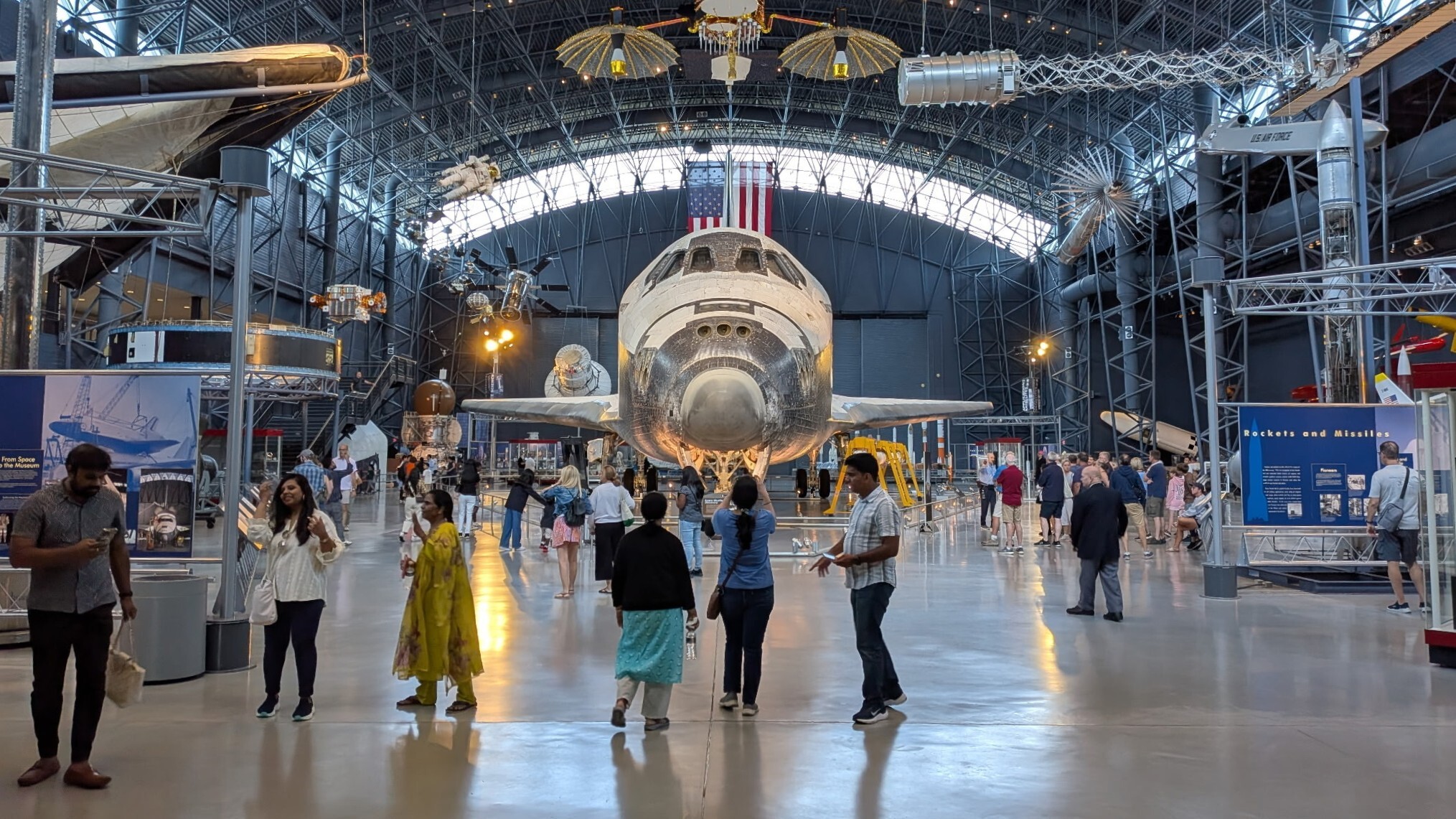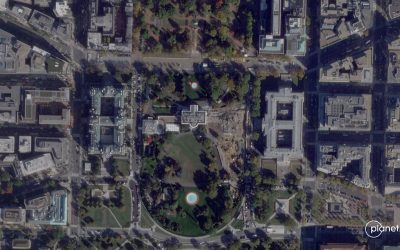The contentious fight for space shuttle Discovery has taken a dramatic new turn, escalating to involve the Justice Department.
Three Texas lawmakers are urging the Department of Justice to investigate the Smithsonian Institution for alleged violations of the Anti Lobbying Act. Senators John Cornyn and Ted Cruz, joined by Representative Randy Weber, have formally requested the probe. This demand comes as the three officials have previously advocated for the relocation of the Space Shuttle Discovery from the Smithsonian’s Udvar-Hazy Center in Virginia to Texas.
Congressional lawmakers have formally accused the Smithsonian Institution of misusing federal funds to actively campaign against President Trump’s “One Big Beautiful Bill Act” (OBBBA).
In an October 22 letter addressed to Attorney General Pam Bondi and Assistant Attorney General Brett Shumate, the legislators allege the Smithsonian deployed taxpayer resources to thwart the act’s directive: the transfer of the Space Shuttle Discovery to NASA’s Johnson Space Center in Houston.
Specifically, the letter claims the Smithsonian engaged in lobbying Senate and House committee staff, collaborated with journalists to generate media coverage favoring the shuttle’s continued presence in its collection, and disseminated inflated figures for the potential relocation costs.

The origins of the ongoing controversy can be traced back to the “Bring the Space Shuttle Home Act,” initially introduced by senators in April. While that legislative effort failed to advance in committee, its core provisions were later incorporated into what President Trump famously dubbed his “big beautiful bill.”
The updated statutory language, notably, did not explicitly name the shuttle Discovery. Instead, it broadly directed the transfer of a human-flown “space vehicle” to a NASA center “involved in the administration of the Commercial Crew Program.” Following its signing into law on July 4, the bill established a firm deadline for the NASA administrator to select the designated vehicle and simultaneously allotted an 18-month window for its subsequent relocation to Houston.
In a recent letter, lawmakers championed Houston as the “cornerstone of America’s human space exploration program,” conveying the city’s readiness and honor to welcome the Space Shuttle Discovery. This sentiment, however, stands in contrast to the Smithsonian’s firm assertion of outright ownership of the historic orbiter. The institution has articulated serious reservations, citing not only the legal ramifications of removing such a significant artifact from the stewardship of its national collection, but also the formidable logistical hurdles and substantial costs involved in transporting the 122-foot-long (37-meter) spacecraft across the country.
In a recent communication to Congress, the Smithsonian revealed that relocating the Space Shuttle Discovery would incur costs significantly exceeding initial projections. Both the Smithsonian and NASA have determined that such a move would necessitate the partial disassembly of the historic spacecraft.
The estimated minimum expense for this endeavor ranges from $120 million to $150 million. This figure dramatically surpasses the $85 million allocated in the proposed OBBA, which has yet to be formally appropriated. Furthermore, this substantial estimate does not include the additional cost of constructing a new dedicated facility in Houston to house the shuttle.

More than a decade ago, the Smithsonian Institution was selected as the final, permanent home for Space Shuttle Discovery. This pivotal decision emerged from a competitive nationwide bidding process, initiated following the 2011 retirement of the venerable space shuttle fleet. Across the country, educational institutions, museums, scientific facilities, and prominent space center complexes—including both the Smithsonian and the Johnson Space Center—each put forward proposals vying for the honor.
NASA’s iconic Space Shuttle fleet has found its permanent homes across the United States. The orbiter Atlantis now resides at the Kennedy Space Center Visitor Complex in Florida, while Endeavour embarked on its final journey to the California Science Center. For Discovery, the venerable spacecraft was entrusted to the Smithsonian Institution.
In 2012, NASA solidified this transfer by handing over “all rights, title, interest and ownership” of Discovery to the museum, according to Smithsonian officials. With this comprehensive legal documentation, the Institution has underscored its explicit responsibility for the shuttle’s meticulous conservation and enduring stewardship for generations to come.
Texas lawmakers have issued a strong rebuttal to the Smithsonian, rejecting both the museum’s cost estimates for transporting the Space Shuttle Discovery and its fundamental legal claim of ownership.
In a letter sent to the Department of Justice, state officials cited “industry experts” who contend that the true cost of transportation is more than ten times lower than the Smithsonian’s projections. Furthermore, the lawmakers’ correspondence directly disputes the Institution’s assertion that it operates independently and is not a government entity.
The Smithsonian Institution holds a distinctive historical designation as a “trust instrumentality.” This unique status means it was established by Congress to fulfill a vital public purpose, yet operates independently from the traditional structure of federal agencies. Although the Institution receives two-thirds of its funding from government appropriations, it maintains operational autonomy, especially in the careful stewardship of its vast national collection. These priceless artifacts are held in trust for the American public, meticulously preserved to ensure they remain a permanent, publicly owned legacy for future generations.
In a joint letter, Senators Cornyn and Cruz, alongside Representative Weber, have formally urged the Department of Justice to investigate whether the Smithsonian Institution deployed its personnel or financial resources in an attempt to obstruct the implementation of a specific federal law.
These activities, the letter highlights, prompt significant concerns under the Anti-Lobbying Act. This federal statute explicitly prohibits the expenditure of appropriated funds for communications designed to sway public opinion and encourage citizens to pressure Congress on legislative or budget matters. Furthermore, the Act imposes stringent limits on all direct or indirect lobbying endeavors financed by federal appropriations.
Lawmakers have escalated their criticism of the Smithsonian Institution’s leadership and exhibits, alleging they are promoting “a politicized agenda” that compromises the federal entity’s responsibilities. The intensified objections specifically target the Institution’s portrayal of slavery in American history and its decision to include transgender women in the upcoming American Women’s History Museum.
Joe Stief, founder of KeeptheShuttle.org – an independent group actively opposing the relocation of Space Shuttle Discovery – denounced what he termed a “silly attempt to silence” the Smithsonian. Stief asserted that this effort was aimed at preventing the institution from publicly defending its full and permanent “right, title and interest” in the iconic spacecraft. His comments were made to Space.com in an email dated October 22.
The Smithsonian Institution operates under the direct oversight of its Board of Regents. This distinguished governing body is led by the Chief Justice of the Supreme Court, who serves as its chancellor. The board’s composition includes the Vice President of the United States, three members from the U.S. House of Representatives, three from the Senate, and nine citizen regents.
According to Stief, the lawmakers’ present complaint directly mirrors an appeal made to Chief Justice John Roberts in August, which publicly went unanswered. Given the Chief Justice’s silence on the earlier statement, Stief suggested that Senator Cornyn now appears to be seeking a more receptive audience within the Department of Justice.
In their communication to the Department of Justice, lawmakers explicitly cited several court decisions that affirm the Smithsonian’s standing as a federal government entity. These rulings consistently characterize the institution as “a government institution through and through,” fully subject to federal law and entitled to government immunities. However, this established federal distinction complicates the lawmakers’ accompanying accusation that the Smithsonian’s interactions with Congress amount to lobbying; given its governmental status, such communications might not legally qualify as lobbying.
Federal entities that communicate directly with Congress regarding official business are not considered to be lobbying, a crucial distinction clarified by guidance from the Department of Justice and the Government Accountability Office. These interactions are instead categorized as intragovernmental coordination. Officials emphasize that the Anti-Lobbying Act specifically targets public-pressure campaigns, not routine correspondence or internal communications between government agencies.
The potential outcome of a formal Department of Justice review, regarding the Texas lawmakers’ concerns, remains uncertain. Such an inquiry could significantly clarify the scope of the Anti-Lobbying Act, particularly its applicability to “hybrid institutions” like the Smithsonian, which operate with a blend of federal appropriations and private trust funding. The Smithsonian has not yet publicly addressed the legislators’ letter and is presently unable to issue a response due to the ongoing government shutdown.







